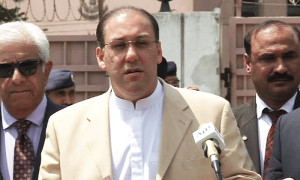Geek
Chief Minister (5k+ posts)
The group, Bytes for All, claims the likely tapping of its communications through the UKs Tempora mass interception program violates its rights under European law, because the tapping would have taken place in the UK.
A technology-focused Pakistani human rights group has sued the British government over its Tempora cable-tapping program, a major part of the UKs contribution to global surveillance by the Five Eyes countries.
On Thursday Bytes for All (B4A), which campaigns on issues such as violence against women and freedom of expression, complained that Tempora was illegal under the privacy safeguards of the European Convention on Human Rights (ECHR) and had a disproportionate effect on non-UK nationals such as its own staff, again in breach of the ECHR.
The suit was lodged with the UKs Investigatory Powers Tribunal (IPT), building on an earlier suit launched by the British rights group Privacy International. As NSA leaker Edward Snowden revealed, the UK taps into the undersea cables that carry the worlds internet traffic many of these cables touch the UK, which is why its so easy on behalf of the Five Eyes cabal that also takes in the U.S., Canada, Australia and New Zealand.
It remains to be seen how far B4A will get in this endeavor, as the IPT has a history of stonewalling after a start characterized by swathes of silence, Privacy Internationals case is on some sort of road, but Privacy International tells me: The tribunal is shrouded by secrecy, so as the case progresses we intend to advocate for as much transparency and openness as possible.
Nonetheless, B4A is using the IPT to target the UK foreign secretary, home secretary and attorney general, as well as the three big spy agencies, the Secret Intelligence Service (MI6), the Security Service (MI5) and Government Communications Headquarters (GCHQ, the UKs version of the NSA). The groups argument goes roughly as follows:
There is no clear legal framework governing Tempora, and the program is in any case disproportionate, breaching the Regulation of Investigatory Powers Act (RIPA) that the UK government argues allows it.
B4A communicates with human rights groups around the world, using the internet. Much of this information is sensitive and shared in confidence. Much of it passes the UK, and must surely be open to interception.
The European Court of Human Rights has previously established on multiple occasions that the ECHR protects people who may not be sited within Europe, but whose right was violated within the territory. In other words, the tapping is done in the UK, so thats the appropriate jurisdiction for the complaint.
RIPA grants more protection to the communications of UK nationals than it does to foreigners, meaning B4As communications are by definition more likely to be subject to interception than those originating from UK nationals, and more likely to be targeted for review. This, the group argues, represents discrimination against non-UK nationals that again violates the ECHR.
B4A wants the IPT to declare Tempora and similar programs illegal and stop them in their tracks, while also destroying any unlawfully obtained material.
The suit will add to a growing clamor from activists, academics and artists who want an end to mass surveillance, but B4A is certainly aiming high with its approach. The IPT very rarely upholds complaints about official surveillance and, when it does, the cases tend to involve human error or system-related technical problems.
Privacy International Legal Office Caroline Wilson Palow offered this by way of comment:
It is clear that mass surveillance programs like Tempora have a disproportionate impact on those who live outside the country, since foreigners phone calls, emails, or internet searches currently receive even fewer legal protections than the communications of those who reside in the UK. It is wrong and we argue illegal for the UK to discriminate without any reasonable basis between UK and non-UK nationals when spying on their communications.
Furthermore, when it comes to the interception of communications, the violation of rights occurs where the interception takes place. People who have had their communications intercepted, no matter their location or nationality, should be able to object to that interference in the courts and tribunals of the country that carried out the interception. Given the borderless nature of todays communications, the UKs ability to gobble up the vast majority of internet and phone traffic that travels through undersea fibre optic cables passing through its territory puts the worlds privacy rights at risk.
http://gigaom.com/2014/01/09/pakistani-human-rights-group-sues-uk-government-over-surveillance/
A technology-focused Pakistani human rights group has sued the British government over its Tempora cable-tapping program, a major part of the UKs contribution to global surveillance by the Five Eyes countries.
On Thursday Bytes for All (B4A), which campaigns on issues such as violence against women and freedom of expression, complained that Tempora was illegal under the privacy safeguards of the European Convention on Human Rights (ECHR) and had a disproportionate effect on non-UK nationals such as its own staff, again in breach of the ECHR.
The suit was lodged with the UKs Investigatory Powers Tribunal (IPT), building on an earlier suit launched by the British rights group Privacy International. As NSA leaker Edward Snowden revealed, the UK taps into the undersea cables that carry the worlds internet traffic many of these cables touch the UK, which is why its so easy on behalf of the Five Eyes cabal that also takes in the U.S., Canada, Australia and New Zealand.
It remains to be seen how far B4A will get in this endeavor, as the IPT has a history of stonewalling after a start characterized by swathes of silence, Privacy Internationals case is on some sort of road, but Privacy International tells me: The tribunal is shrouded by secrecy, so as the case progresses we intend to advocate for as much transparency and openness as possible.
Nonetheless, B4A is using the IPT to target the UK foreign secretary, home secretary and attorney general, as well as the three big spy agencies, the Secret Intelligence Service (MI6), the Security Service (MI5) and Government Communications Headquarters (GCHQ, the UKs version of the NSA). The groups argument goes roughly as follows:
There is no clear legal framework governing Tempora, and the program is in any case disproportionate, breaching the Regulation of Investigatory Powers Act (RIPA) that the UK government argues allows it.
B4A communicates with human rights groups around the world, using the internet. Much of this information is sensitive and shared in confidence. Much of it passes the UK, and must surely be open to interception.
The European Court of Human Rights has previously established on multiple occasions that the ECHR protects people who may not be sited within Europe, but whose right was violated within the territory. In other words, the tapping is done in the UK, so thats the appropriate jurisdiction for the complaint.
RIPA grants more protection to the communications of UK nationals than it does to foreigners, meaning B4As communications are by definition more likely to be subject to interception than those originating from UK nationals, and more likely to be targeted for review. This, the group argues, represents discrimination against non-UK nationals that again violates the ECHR.
B4A wants the IPT to declare Tempora and similar programs illegal and stop them in their tracks, while also destroying any unlawfully obtained material.
The suit will add to a growing clamor from activists, academics and artists who want an end to mass surveillance, but B4A is certainly aiming high with its approach. The IPT very rarely upholds complaints about official surveillance and, when it does, the cases tend to involve human error or system-related technical problems.
Privacy International Legal Office Caroline Wilson Palow offered this by way of comment:
It is clear that mass surveillance programs like Tempora have a disproportionate impact on those who live outside the country, since foreigners phone calls, emails, or internet searches currently receive even fewer legal protections than the communications of those who reside in the UK. It is wrong and we argue illegal for the UK to discriminate without any reasonable basis between UK and non-UK nationals when spying on their communications.
Furthermore, when it comes to the interception of communications, the violation of rights occurs where the interception takes place. People who have had their communications intercepted, no matter their location or nationality, should be able to object to that interference in the courts and tribunals of the country that carried out the interception. Given the borderless nature of todays communications, the UKs ability to gobble up the vast majority of internet and phone traffic that travels through undersea fibre optic cables passing through its territory puts the worlds privacy rights at risk.
http://gigaom.com/2014/01/09/pakistani-human-rights-group-sues-uk-government-over-surveillance/
































